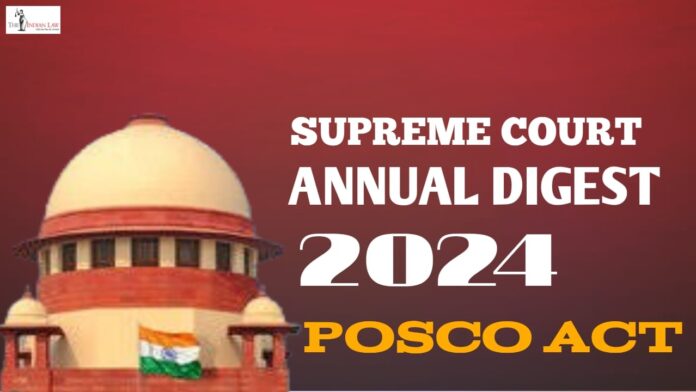Understanding the Supreme Court’s Insights on the POCSO Act: Key Takeaways from the 2024 Annual Digest
The Protection of Children from Sexual Offences (POCSO) Act, introduced in 2012, has been a significant legal framework aimed at safeguarding children against sexual abuse and exploitation in India. In 2024, the Supreme Court of India, through its Annual Digest, has provided important legal perspectives and clarifications regarding the implementation and interpretation of the POCSO Act. These developments underline the evolving judicial understanding of children’s rights and the importance of a robust legal framework in ensuring their protection.
The Supreme Court’s Role in Shaping POCSO Jurisprudence
The Supreme Court has been instrumental in shaping the trajectory of the POCSO Act, offering crucial guidance on issues that often raise complex questions. With the passage of time, the Act has become an essential part of India’s child protection laws, but its interpretation continues to be refined through landmark judicial decisions.
One of the key highlights from the 2024 Digest was the Court’s continued commitment to the spirit of the Act: ensuring the safety and dignity of children. The Court reaffirmed the necessity of a child-centric approach in cases under the POCSO Act, stressing that children must be treated as victims, not as participants in legal proceedings.
1. Emphasis on Victim’s Testimony and Protection
In 2024, the Supreme Court issued rulings underscoring the importance of the child’s testimony in cases of sexual offences. The Court noted that in cases where there is no corroborative evidence, the testimony of the child should not be viewed with suspicion. Importantly, the Court emphasized that the integrity of the child’s testimony should be assessed based on its consistency and credibility, and not merely on the basis of age or perceived maturity.
The Digest also highlighted the Court’s firm stance on ensuring that children do not face secondary victimization during the trial process. In recent rulings, it directed lower courts to take specific measures to protect the child victim during cross-examination, such as using screens to shield the child from the accused.
2. Increased Focus on Psychological Support
A significant addition to the Supreme Court’s approach in 2024 has been the recognition of the psychological toll on child victims of sexual abuse. The Court called for greater attention to the mental health needs of these children and stressed the importance of counseling services. Recognizing the lasting trauma such abuse can inflict, the Court directed that the availability of mental health professionals be ensured in all stages of the trial, from investigation to prosecution.
This holistic approach aims to aid the recovery of the child, ensuring their emotional well-being is not overlooked during the legal process.
3. Deliberation on Minimum Punishments and Justice for the Child
The Supreme Court’s 2024 Digest also brought attention to the ongoing debate over the minimum sentencing provisions under the POCSO Act. The Court carefully analyzed instances where the minimum prescribed punishments were being used in cases where the gravity of the offence warranted harsher penalties. The Digest provided insights into the Court’s stance that justice should be both swift and fitting, with a clear message that leniency will not be tolerated when it comes to crimes against children.
In doing so, the Court reinforced the idea that the POCSO Act’s primary aim is not just legal retribution but also the restoration of the child’s sense of safety and security.
4. Guidelines for Proper Investigation and Handling of Evidence
One of the key aspects highlighted in the 2024 Digest was the Court’s insistence on stringent investigation protocols for cases under the POCSO Act. The Court recognized that the investigation of child sexual abuse cases requires sensitivity, skill, and thoroughness. It issued directions regarding the importance of ensuring that child victims are not subjected to repeated or invasive questioning, which often leads to further trauma.
Furthermore, the Digest reiterated the Court’s concerns about improper handling of evidence in such cases. In particular, the Court pointed out the necessity of preserving the dignity of the child throughout the legal process and ensuring that any medical examination or forensic procedure follows child-friendly protocols.
5. The Intersection of Technology and Child Protection
In 2024, the Supreme Court also delved into the growing intersection of technology and child protection. With the rise of online child sexual exploitation, the Court explored how the POCSO Act can be effectively applied to cases involving digital media. This included the distribution and possession of child sexual abuse material (CSAM), where the Court called for robust mechanisms to address crimes in the digital space, urging authorities to work with tech companies to detect and report such content.
Conclusion: A Path Forward for Child Protection
The Supreme Court’s decisions in the 2024 Annual Digest reaffirm that the protection of children is paramount and that the POCSO Act is a cornerstone in this mission. By focusing on the welfare of the child throughout the judicial process—whether through prioritizing the victim’s testimony, ensuring psychological support, or maintaining stringent sentencing standards—the Court has further solidified the need for a legal framework that adapts to the complexities of child protection in modern society.
As India moves forward, these judicial insights serve as an important reminder that the fight against child sexual abuse is ongoing. The Supreme Court’s guidance in 2024 helps pave the way for a more effective, empathetic, and comprehensive approach to safeguarding the children of India.



